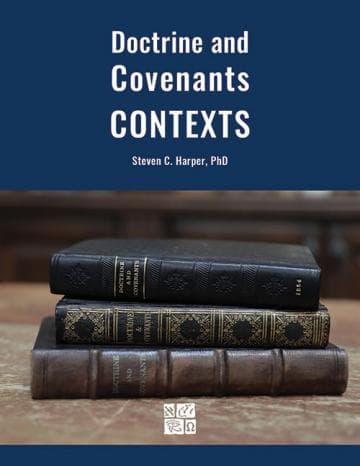Book
136 Chapters

As 1834 dawned, the Saints in Missouri were “exiles in a land of liberty.”[1] They sent Parley Pratt and Lyman Wight to seek Joseph’s counsel in Kirtland, Ohio. The messengers probably carried a letter from William Phelps informing Joseph that Missouri governor Daniel Dunklin was willing to help the Saints get their Jackson County lands back, but he would not maintain a militia to defend them indefinitely.[2] Would eastern Saints come to the aid of Zion? Joseph counseled with his brethren, resolved that “he was going to Missouri, to assist in redeeming it,” and asked for volunteers to go with him. Sometime in this sequence of events, the Lord revealed section 103 to Joseph. It is not clear whether the revelation motivated Joseph’s actions or affirmed them after the fact.[3]
Zion depended on the Latter-day Saints. They had been driven by wicked people acting on their own free will. In section 103 the Lord promises to punish them “in mine own time” (D&C 103:2–3). But the Saints were driven “because they did not hearken altogether unto the precepts and commandments which I gave unto them” (v. 5, emphasis added). The Lord offers another chance at Zion by revealing the conditions on which the Saints can prevail against their enemies. First he states these positively (what will happen if they do, verses 5–7), then restates them negatively (what will happen if they do not, verses 8–10). Section 103 reaffirms section 58’s promise that Zion will come “after much tribulation” (v. 12). Even that promise, the Lord qualifies, is conditional. “If they pollute their inheritances,” he says of the Saints again, “they shall be thrown down” (v. 14, cross-reference D&C 84:59).
Beginning in verse 15, the Lord maps out the way Zion will be reclaimed “by power.” Then the Lord evokes section 101, reminding the Saints of his promise to raise up a Moses to lead the modern Israelites. He calls on Joseph to gather an army of Israel. It could get violent, the Lord suggests, perhaps as a test to see who is willing “to lay down his life for my sake” (D&C 103:27).
The Lord appoints eight recruiters, including Joseph, to gather five hundred more men to march to Zion, though he acknowledges that, because they are free agents, “men do not always do my will,” and that relatively few may respond to the call. He forbids the undertaking unless at least one hundred men are willing to consecrate their lives to Zion. The Lord leaves the outcome in the hands of the free agents. “All victory and glory is brought to pass unto you through your diligence, faithfulness, and prayers of faith” (D&C 103:36).
Heber Kimball described the action motivated by section 103:
Brother Joseph . . . sent Messengers to the East and to the North, to the West and to the South to gather up the Elders and, He gathered together as many of the brethren as he conveniently could, with what means they could spare to go up to Zion and render all the assistance that we could to our afflicted brethren. We gathered clothing and other necessaries to carry up to our brethren and sisters who had been plundered; and putting our horses to the wagons and taking our firelocks and ammunition, we started on our journey.[4]
They were a faltering band, to be sure, but willing to give their lives for Zion. Section 103’s most significant result is the way it tested that resolve. A local newspaper reported on section 103: “In obedience to a revelation communicated to their great Prophet, Joseph Smith, three hundred young men are to ‘go well armed and equipped to defend the promised land in Missouri.”[5] The revelation seems purposefully ambiguous, leaving Joseph and his followers uncertain how Zion would be redeemed. “By power,” they knew, but what kind of power? Were they to take the promised land by the force of arms? Would the God of Israel lead them with “a stretched-out arm” (D&C 103:17)? Would they lay down their lives? The revelation raised these questions but did not answer them, making it a suitable test of faith and sacrifice (D&C 101:4–5).
The Camp of Israel, as it came to be known, literally walked in faith, the considerable faith required to kiss one’s family goodbye and march with a small, poorly equipped band to an unknown encounter for the cause of Zion. As a result of section 103, the Lord let many, though not as many as he asked for, pledge their allegiance to him and his cause. Their lives were his. He let them march all the way there before explaining that the power to redeem Zion would come not from a confrontation in Missouri but from an endowment in the House of the Lord back in Kirtland (see section 105).
[1] Kenneth H. Winn, Exiles in a Land of Liberty: Mormons in America, 1830–1846 (Chapel Hill: University of North Carolina Press, 1989).
[2] William W. Phelps to Dear Brethren, December 15, 1833, in The Evening and the Morning Star 2:16 (January 1834): 127.
[3] Historical Introduction to Revelation, 24 February 1834 [D&C 103], p. [7], The Joseph Smith Papers, accessed November 12, 2020.
[5] “Mormonism,” Huron Reflector (Norwalk, OH), May 20, 1834, [2], italics in original.
Book
136 Chapters
Items in the BMC Archive are made publicly available for non-commercial, private use. Inclusion within the BMC Archive does not imply endorsement. Items do not represent the official views of The Church of Jesus Christ of Latter-day Saints or of Book of Mormon Central.